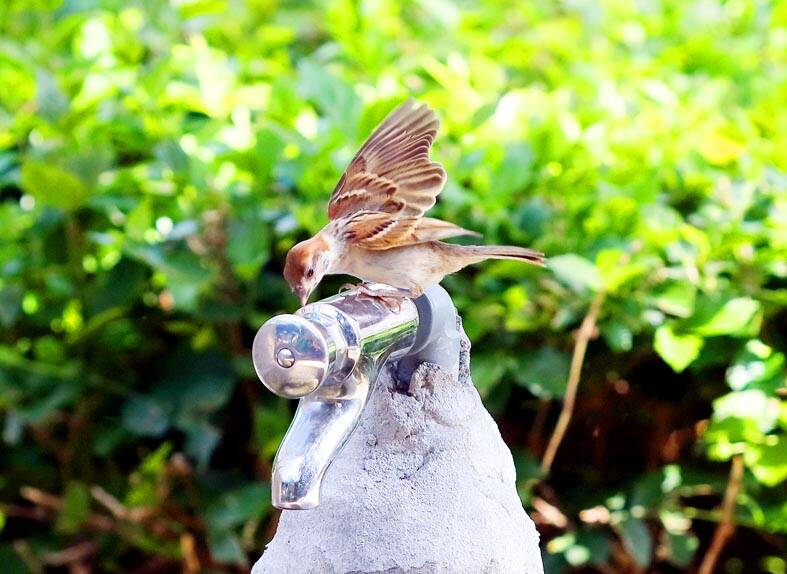Nantou County’s Wildlife Rescue and Research Center has treated about 600 wild animals during the first half of this year, nearly 150 of which have been released, while more than 145 are recuperating, Ministry of Agriculture officials said yesterday.
Data compiled by the ministry’s Taiwan Biodiversity Research Center showed that more than 270 of the animals, or about 45 percent, brought to the Jiji Township (集集) facility died, either during transportation or while receiving treatment.
Researchers at the center said that the fatality rate was too high, and, as many animals were injured due to human activity, the public should take care when interacting with wildlife.

Photo: CNA
The largest groups of animals brought to the Wildlife Rescue and Research Center from January to June were sparrows (78) and swifts (54), most of which were hatchlings, agriculture officials said.
Previously, pangolins and leopard cats, the nation’s most well-known protected species, were the biggest groups treated at the facility.
Ministry officials said that the birds’ habitats overlap with regions with human activity, and that the felling of trees or attempts to capture the birds led to injuries during the mating and hatching season.
Hatchlings from destroyed nests are abandoned by their parents, they added.
Veterinarians and animal care specialists are calling for enhanced public education about protecting wildlife, they said.
Other animals brought to the Wildlife Rescue and Research Center for treatment, were pangolins (31), followed by black-faced spoonbills (30) and collard scops owls (30).
The list also included leopard cats (28), masked palm civets (27), Formosan ferret-badgers (25), crested goshawks (18) and black-crowned night herons (17).
The data were the first publicly released figures from the Taiwan Biodiversity Research Center, which until Aug. 1 was known as the Endemic Species Research Institute.

Taiwanese can file complaints with the Tourism Administration to report travel agencies if their activities caused termination of a person’s citizenship, Mainland Affairs Council Minister Chiu Chui-cheng (邱垂正) said yesterday, after a podcaster highlighted a case in which a person’s citizenship was canceled for receiving a single-use Chinese passport to enter Russia. The council is aware of incidents in which people who signed up through Chinese travel agencies for tours of Russia were told they could obtain Russian visas and fast-track border clearance, Chiu told reporters on the sidelines of an event in Taipei. However, the travel agencies actually applied

New measures aimed at making Taiwan more attractive to foreign professionals came into effect this month, the National Development Council said yesterday. Among the changes, international students at Taiwanese universities would be able to work in Taiwan without a work permit in the two years after they graduate, explainer materials provided by the council said. In addition, foreign nationals who graduated from one of the world’s top 200 universities within the past five years can also apply for a two-year open work permit. Previously, those graduates would have needed to apply for a work permit using point-based criteria or have a Taiwanese company

The Shilin District Prosecutors’ Office yesterday indicted two Taiwanese and issued a wanted notice for Pete Liu (劉作虎), founder of Shenzhen-based smartphone manufacturer OnePlus Technology Co (萬普拉斯科技), for allegedly contravening the Act Governing Relations Between the People of the Taiwan Area and the Mainland Area (臺灣地區與大陸地區人民關係條例) by poaching 70 engineers in Taiwan. Liu allegedly traveled to Taiwan at the end of 2014 and met with a Taiwanese man surnamed Lin (林) to discuss establishing a mobile software research and development (R&D) team in Taiwan, prosecutors said. Without approval from the government, Lin, following Liu’s instructions, recruited more than 70 software

Chinese spouse and influencer Guan Guan’s (關關) residency permit has been revoked for repeatedly posting pro-China videos that threaten national security, the National Immigration Agency confirmed today. Guan Guan has said many controversial statements in her videos posted to Douyin (抖音), including “the red flag will soon be painted all over Taiwan” and “Taiwan is an inseparable part of China,” and expressing hope for expedited reunification. The agency last year received multiple reports alleging that Guan Guan had advocated for armed reunification. After verifying the reports, the agency last month issued a notice requiring her to appear and explain her actions. Guan